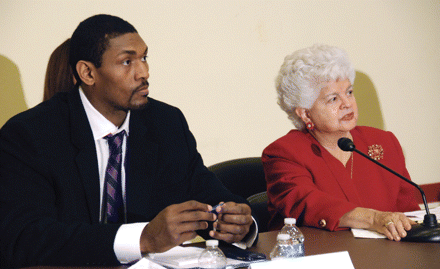U.S. Rep. Grace Napolitano (D-Calif.) brought some real muscle to Capitol Hill to announce the reintroduction of the Mental Health in Schools Act of 2011.
Whether that can be translated into enough political muscle to enact the bill is another question. The competitive-grant program would allow schools to hire more mental health professionals to work with students.
Napolitano invited Los Angeles Lakers' basketball star Ron Artest and champion boxer Mia St. John to speak to congressional staffers about the value of early identification and treatment of mental illness among school children.
Last fall, both Artest and St. John spent a day learning about mental health issues, including suicide prevention, and then visiting schools in Napolitano's congressional district.
The bill, HR 751, builds on a pilot program that has been running in the district around Santa Fe Springs in the Los Angeles area for 10 years. The bill would allocate $200 million in grants of up to $1 million each and would be distributed by the Substance Abuse and Mental Health Services Administration.
APA has signed a letter of support for the proposed legislation.
The money would fund "school mental health program[s] that incorporate positive behavioral interventions and supports to foster the health and development of children," according to the bill.
At the briefing, Artest offered himself as proof of the value of therapy. He said he had been in some form of counseling since age 13. Over the years, he has taken part in marriage counseling and parent training. Anger-management programs were indicated, he explained, after a 2004 brawl during a game in Detroit (that led to a 73-game suspension for him) and a 2007 domestic-violence arrest. Seeing a psychiatrist, he emphasized, "does not make me weak."
He has been open about his use of mental health care. Last fall, he placed his 2010 NBA championship ring up for auction online. The $651,006 raised in the auction was donated to nonprofit organizations that provide mental health services to people who can't afford them.
"I could have kept the ring and enjoyed it individually, but I thought about the young people," said Artest. "I needed to send a message. The ring had superhuman powers."
St. John spoke of her own troubled youth and the sense of failure she felt until she was hospitalized by her mother and husband. She was diagnosed with obsessive-compulsive disorder and anxiety, and recovered following extensive treatment. She went on to earn a degree in psychology and then set out to pursue her dream to box professionally, eventually winning the world championship.
"I wish this bill was in place when I was in school and when my kids were in school," St. John said. "Children and parents need to be provided with knowledge and support for the mental illnesses that many of them are suffering from. We don't want these kids turning to drugs and alcohol to self-medicate or, even worse, suicide."
The Mental Health in Schools Act would expand the scope and funding for the Safe Schools–Healthy Students program by placing accredited mental health professionals in schools. The bill also proposes mental health education for parents and targeted staff development on mental health issues for teachers and other school personnel.
If enacted, the bill would help address mental health problems early in their course, before children become enmeshed in crime or drug use or become depressed or suicidal, according to Napolitano. That, in turn, would reduce the societal burden for social services and imprisonment.
"This bill will prevent kids from going on the wrong path," said Artest.
Napolitano's briefing came as the new Republican majority in Congress threatened to slash budgets for just the sort of discretionary funding needed for her project.
"Well, there's never a good time to tackle mental health issues," she said in an interview with Psychiatric News after the briefing. "If you want to help people, you have to start somewhere."

